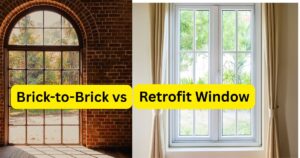So, you’ve got a home that has seen its fair share of snowstorms, heat waves, and everything in between? And to deal with these extreme climates, your home needs reliable and durable windows.
But don’t know how to select windows for extreme climates? Don’t worry, you’re not alone in this puzzle — the NUVO team is here to break down the selection process for you.
When it comes to selecting the perfect window, you need to focus on some crucial factors, like —
- The window size, design, and type
- How many window panes are included
- The type of glass and its ratings, SHGC, u-value, emissivity, and more.
- What type of frame you’re using
These are just a few key factors, but there are even more. Ready to learn a comprehensive guide on window selection? Let’s jump in!
Importance of the Right Window for Extreme Climates in Ontario
As a Canadian homeowner, selecting the perfect windows for your home is crucial. From bone-chilling winters to scorching summers, your windows play a pivotal role in maintaining energy efficiency and indoor comfort.
There are many reasons why you need a solid window for harsh climate, but here are the top reasons:
Turn Your Home Energy-Efficient with Windows
Investing in energy-efficient windows is a game-changer for Ontario homeowners like you. Look for a window with high R-values and low U-factors.
But why? It’ll keep precious heat inside during the frosty months and block unwanted solar gain during the sweltering summers. This dynamic duo helps lower your energy bills and reduces your carbon footprint.
The result? A cosier and more sustainable home, while the window makes your wallet a little happier as well!
Make Windows Stand Tall against the Weather
But it’s not just about efficiency – when nature throws her worst at your home, you need windows that can take a punch. In regions prone to heavy snowfall, hail, or violent storms, impact-resistant windows are a must-have.
Sturdy frames and tempered glass can withstand the fury, safeguarding your home from damage and potential injuries. Durable windows also require less maintenance, saving you time and money in the long run – it’s like having a personal bodyguard for your home!
Insulation for Year-Round Comfort
Who doesn’t enjoy living in a comfortable, outer, noise-free, and allergen-resistant home? You would also prefer having such a home environment, aren’t you?
Exceptional insulation is the key to a cosy, draft-free home. High-performance windows with multiple panes and airtight seals can significantly reduce heat transfer.
Consequently, it keeps your living spaces comfortable while lowering your heating and cooling costs. Picking the right window is like having your own personal climate control system in every room!
How to Select Windows for Extreme Climates
Selecting the ideal window for Canadian weather is like studying windows for exams. Here are in-depth details about windows for Canadian weather:
For Hot and Humid Climate
Feeling the heat? In those toasty hot and humid regions, you’ll want to keep those pesky solar rays at bay like a goalie blocking a slapshot.
Look for windows with a low Solar Heat Gain Coefficient (SHGC) – it’s like having your personal force field against that relentless sunshine. And let’s not forget about glare and UV exposure!
Reflective or tinted glass is the way to go. Top it off with some low-E coatings, and you’ve got an efficient window that can reduce glare at home.
For Cold and Snowy Climates
Canada’s winters are harsh, with temperatures sometimes dropping below -20°C. To keep the cold out, choose windows with a low U-factor and double or triple-pane glass. These features keep your home warm and cosy.
Don’t forget the window frames. A worn frame or broken seal lets warm air escape, making your home colder and increasing heating costs. A tight seal and sturdy frame are just as important as the glass.
For Coastal/Hurricane-Prone Areas
If you live in Ontario, Quebec, or near the Atlantic coast, you know how rough the weather can get. Hurricanes and heavy rain are common, and the thought of strong winds breaking your windows is enough to make anyone uneasy.
To stay safe, you need windows that can handle high winds, flying debris, and salty sea air. Impact-resistant glass or durable shutters are essential for protecting your home during storms.
Don’t forget about the frames. Vinyl or fibreglass frames resist corrosion and hold up well in harsh conditions. Make sure the seals are tight too. A solid seal keeps water out and prevents a bigger mess inside.
Stay prepared, and your home will be ready for whatever the weather throws at you.
Window Considerations for Extreme Climates
Now let’s learn about some specific considerations that’ll help you to find the right windows. Such as:
Window Styles and Sizes
There are lots of window styles available on the market, but not all of them are suitable for your home. You need a window style that’ll offer you benefits against the weather as well as maintain the beauty of your home.
For example, casement, slide, and awning windows are mostly preferred by natives. However, the casement window isn’t preferable for coastal areas.
Large windows, like casement, are slightly less strong than small windows. These are prone to breakage due to high-pressure wind. You can use small windows like awnings for hurricane-prone areas.
On the other hand, casement windows are the best option for summer and areas with less harsh climates like Victoria, Vancouver, and Nova Scotia. You can use both sliding and awning during harsh climates in winter.
Window Glass
The window’s style is not enough—you need strong and reliable window glass. Tempered glass, hurricane-resistant glass, and DefenseLite are a few common types of sturdy glass for home windows.
Besides being the strongest glass, there are some other crucial features that the glass should have. For example:
- Low-E (Emissivity) Glass — This features a low-emissivity coating that reflects heat while allowing visible light to pass through. In hot climates, it blocks unwanted solar heat gain and retains indoor heat in winter.
- SHGC — It measures how much solar radiation a window allows to pass through. You should look for a low SHGC (0.25 or less) to block heat and a higher SHGC (0.40 or more) to gain more passive solar heat.
- U-Value Range — The U-value reflects a window’s ability to prevent heat transfer, with lower values indicating better insulation. In frosty areas, choose windows with a U-value of 0.30 or less.
- Gas fills — Upgrading windows with gas fills like argon or krypton can significantly improve thermal performance. These inert gases are denser than air, creating an extra barrier that reduces heat transfer.
- Glass Ratings — Look for the ENERGY STAR® certification, with Window Rating Council (WRC) and Canadian Standards Association (CSA) ratings.
Number of Window Panes
Canada’s harsh climate calls for well-insulated windows, and double-pane or triple-pane options are great choices.
Double-pane windows have two glass layers with a gas-filled gap to reduce heat transfer. They keep your home warm in winter and cool in summer while being more affordable and energy-efficient.
Triple-pane windows add a third glass layer for even better insulation. They’re ideal for extreme temperature changes and also block outside noise, perfect for noisy neighbourhoods.
Your choice depends on your budget, climate, and need for noise reduction. Both options improve comfort and energy savings.
Window Frames
Using high-quality window frames is like having a personal insulation team for your house. It helps control the indoor temperature, trapping the heat.
No more air escaping, no more cranking up the thermostat until the indoors feels cosy and warm.
But what type of window frames are the best? Here are some recommendations from experts:
- Vinyl PVC Frames — They’re affordable, offer great insulation, and can be welded into airtight seals to keep the heat locked inside. Sure, they might not be as burly, but these frames are built to handle the extreme Canadian weather.
- Aluminum Frames — These frames are tough as nails, but they can be a bit on the slim side. That means they don’t provide the best insulation, and heat can slip through faster. It makes aluminium frames ideal for summer.
- Hybrid Frames — An interesting one! It’s made by blending the strengths of vinyl and aluminium. These hybrid frames have a durable outer skin, insulating UPVC, and a core of high-strength aluminium.
Quality Frame Sealing
Weather fluctuations can wreak havoc on window seals, compromising insulation and leading to costly repair if left unaddressed. The solution? You should ensure quality window sealing and caulking of the frame while installing the new window.
Besides, utilising flexible edge spacers within the window frames can prevent these problems too. This material prevents seal failures and gas leaks caused by temperature fluctuations, preserving insulation and structural integrity.
Conclusion
Selecting the right windows for extreme climates is a significant investment in your home’s comfort and energy efficiency. By carefully considering factors like U-factor, SHGC, and window materials, you can choose windows that can withstand harsh weather conditions.
The right window can also reduce your home’s energy costs and improve your overall living experience. If you need any help regarding how to select windows for extreme climates, you may contact NUVO anytime!



